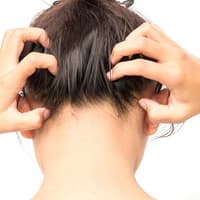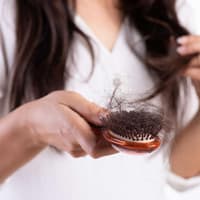
Losing up to 100 hairs a day is said to be normal. A number that can certainly be considerable. Some experts say between 20 and 200 is normal. It is important that you stay within your own range. It is therefore a cause for concern if those affected lose more hair than usual over a longer period of time. Experts estimate that around one in ten women are confronted with this problem between the ages of 20 and 30.
If you are losing more hair than usual in early fall, don't panic straight away. Experts suspect that it is due to the stronger sunlight during the summer, which is now behind you. However, the problem should be over after a few weeks. If you do not have seasonal hair loss, you should first consult a dermatologist to clarify the cause. If there is nothing wrong with your scalp, further research is required.
Hormonal or hereditary hair loss
During the menopause, hair loss is often caused by hormones; one in five women are said to struggle with it. It is important to see a doctor as early as possible, as it is best counteracted in the early stages.
A common form of hair loss is androgenetic alopecia, better known as hereditary or predisposed hair loss. This form causes immense suffering, particularly in women: the hair on the crown of the head becomes thinner and thinner and receding hairlines can also form. This is known as diffuse alopecia, or diffuse hair loss. However, before this is simply accepted as a given, all other causes should be ruled out - for example with a blood test, as you have already seen a dermatologist.
Blood test provides information about the cause of hair loss
It is important that those affected see a doctor as early as possible. The causes can be determined by a blood test. The number of male hormones, iron levels and thyroid hormones are determined and, if necessary, treatment is given. A study by the Dermatest Institute found that serums with the body's own active ingredient thiocyanate can prevent or stop androgenetic and diffuse hair loss. Provided that the hair root is still present. There should also be new hope for baldness sufferers: At the University of Manchester, it was discovered that an active ingredient for the treatment of osteoporosis stimulates hair follicles and hair growth. Studies on this are to be started. Blood tests do not need to be carried out by hormone specialists; they can also be carried out by a GP.
Sometimes a change in diet is enough
Iron deficiency or a one-sided, low-protein diet can also lead to a nutrient deficiency and thus to so-called diffuse hair loss. A change in diet often brings about an improvement. Hair loss can also be triggered by stress, illness, medication, smoking or a combination of several of these factors. Lifestyle is often underestimated as a cause.






